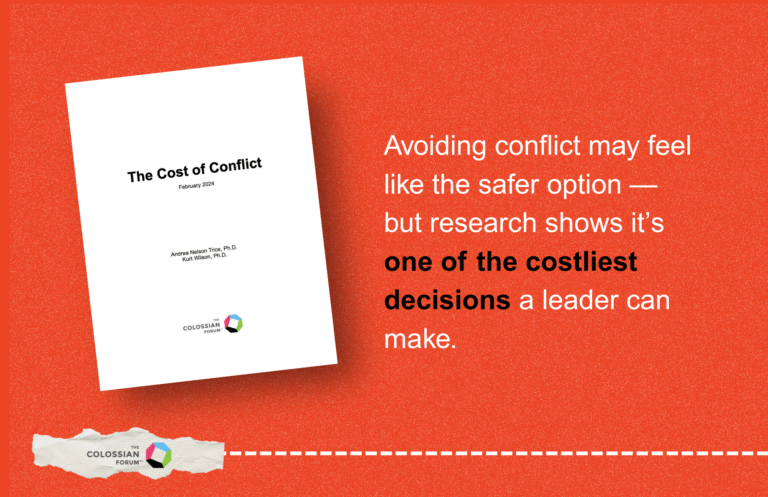Picture a church staff of five. Everyone’s working hard. Tensions are running high, but that’s not unusual. One staff member is frustrated that their input isn’t considered during planning. Another is quietly doing double the work because responsibilities aren’t clear. Two team members disagree about priorities for the fall—but neither wants to press the issue. The senior pastor tries to hold it all together.
No one was surprised there was conflict. But they had no idea what the conflict was actually costing them.
Every church, school, and nonprofit faces conflict. But unresolved or unhealthy conflict doesn’t just create tension in staff meetings or awkward hallway encounters. It drains time, affects morale, and quietly erodes the mission.
To help leaders better understand what’s at stake, The Colossian Forum commissioned an independent research team, EffectX, to study the financial and organizational cost of conflict in Christian institutions. The results of this study are captured in a downloadable white paper called The Cost of Conflict. Drawing on dozens of peer-reviewed studies and field data, the research outlines how conflict in Christian organizations leads to measurable losses, including staff turnover, absenteeism, and decreased donor or member engagement.
What Are We Really Talking About When We Talk About Conflict?
Conflict often feels personal, even painful. But from a research standpoint, conflict in Christian organizations usually falls into three categories:
- Relational conflict – Disagreements rooted in values, personalities, or interpersonal tension.
- Task conflict – Disagreements about what work needs to be done.
- Process conflict – Disagreements about how the work should be done.
All three types can happen in churches, schools, and nonprofits. Some conflict can be productive. It can sharpen ideas, deepen trust, and lead to better decisions. But more often, especially when ignored, conflict produces outcomes that are costly and damaging.
This report focuses on unhealthy conflict, conflict that goes unaddressed or unresolved. In these situations, Christian leaders often feel stuck between preserving relationships and protecting the mission. But left unchecked, the cost of conflict can impact both.
Not Just Interpersonal, But Organizational
While we often think of conflict in personal terms — two people with clashing personalities or hurt feelings — its effects ripple outward. Conflict can lead to:
- Lost time and focus
- Increased absenteeism or burnout
- Disengaged staff and volunteers
- Turnover and loss of institutional knowledge
- Distrust among team members
- Decline in donor support, member involvement, or student enrollment
These aren’t only HR challenges. They’re signs of organizational decline.
The good news is that when leaders understand how conflict functions, and where it shows up, they can respond with clarity and care.

The Bottom Line
The average cost of unresolved conflict across Christian institutions is about $15,500 per staff member, per year. To break down the findings further, the study uncovered significant costs for different kinds of Christian organizations:
- Schools (100 staff): $285,918 per year
- Churches (5 staff): $17,713 per year
- Nonprofits (42 staff): $125,738 per year
This includes costs tied to:
- Time lost managing team conflict
- Stress-related absences
- Staff who are physically present but emotionally checked out (presenteeism)
- Employee turnover
- Loss of church members, students, or donors
- Legal or consulting fees
Leaders often know conflict is present—but don’t see what it’s costing. The time lost to endless clarifications. The emotional load that leads to sick days. The staff who disengage long before they resign. These costs rarely show up in a budget line, but they quietly drain mission, morale, and capacity.
Why This Matters for Christian Leadership
Conflict is unavoidable. But when it’s ignored or mishandled, it leads to real loss—of trust, mission, and witness.
The gospel doesn’t call us to avoid hard conversations. It calls us to engage them with humility, grace, and truth. Ignoring or mismanaging conflict doesn’t just hurt feelings; it creates real, lasting damage to the communities we serve. For Christian leaders, managing team conflict is not just a leadership skill. It’s a form of discipleship.
By taking the cost of conflict seriously, leaders begin to steward not just resources, but people. Not just outcomes, but culture. And in doing so, we reflect the reconciling heart of Christ.
Next Steps for Christian Leaders
If this resonates, you’re not alone, and you’re not stuck.
We invite you to keep going:
👉 Download The Cost of Conflict white paper to learn more about the research conducted by EffectX.
🔔 Check out our upcoming webinars, designed to help Christian leaders like you engage conflict faithfully with courage, wisdom, and hope.